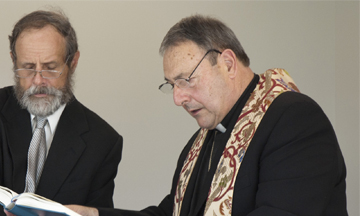
 CHARLESTON—Businesses everywhere are suffering the doldrums of a clingy recession, and cemeteries are no different.
CHARLESTON—Businesses everywhere are suffering the doldrums of a clingy recession, and cemeteries are no different.
Warren Stuckey, diocesan director of cemeteries, said in the past, people planned for the future, often buying entire family plots well in advance.
In recent years, though, sales have dropped to a worrisome level.
“People are just not buying with the economy the way it is,” Stuckey said. “The only people out here are the ones who have to buy because they have a funeral.”
The director said lot sales at Holy Cross Cemetery on James Island have averaged about 134 each year, but projections for 2011 are only 87.
Diocesan finance officials hope the new office at Holy Cross will attract customers and increase revenue.
The new digs, with a conference room and central heating and air, are quite a change from the former sparse conditions.
Stuckey is thrilled to have the new space, but doesn’t believe it will impact sales.
“We will have a much better facility for the families who are coming to Holy Cross,” he said. “But the primary attraction for Catholics isn’t the trees or grass, it’s because it’s holy ground blessed by the bishop.”
Catholic Cemeteries are blessed each year to provide consecrated ground for the faithful.
Bishop Robert E. Guglielmone, who blessed the office during a dedication ceremony Aug. 24, said he has a special affinity for our cemeteries.
Each year, he holds a service in November at a Catholic Cemetery to honor All Soul’s Day. “There is a need for us to commemorate those who have gone before us,” Bishop Guglielmone said.
He added that burial in a Catholic cemetery is a sign of unity and community; a continuation of the faithful journey to eternal life.
It isn’t required, however.
The bishop said Catholics may be buried anywhere because in a secular cemetery, part of the funeral rite is to bless the ground prior to burial. Also, as competition increases, many cemeteries are opening Catholic sections, promoted as consecrated.
Stuckey said this is part of the reason sales have dropped for the diocese. In the day when the faithful had to be buried in a Catholic cemetery, St. Lawrence was a sought-after location.
The historical resting spot in Charleston still has plenty of space, but so far this year, only three customers have purchased lots, Stuckey said.
Holy Cross, which is newer and in a better area, is the bread-winner of the two. While there is a diocesan cemetery fund, Stuckey said Holy Cross has always been self-sustaining, making enough to pay the operating costs of both cemeteries.
That may not be the case if the economy keeps going down, though. Sales have gone from a recent high of 151 lots in 2007 to just 58 so far this year.
In an effort to let Catholics know about their cemeteries, Bishop Guglielmone asked Deacon Joseph Cahill to research how many there are in the diocese.
Not including the two run by the diocese, Deacon Joe and his staff found 19 parish burial grounds. Of those, seven appear to be full, but the rest have available spaces. He said they are funded and maintained in different ways.
Bishop Guglielmone said he would like to have all the cemeteries listed on the diocesan website so Catholics know what is available to them.
